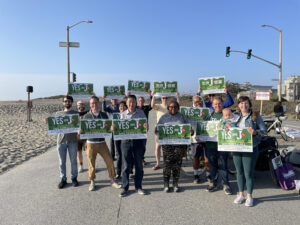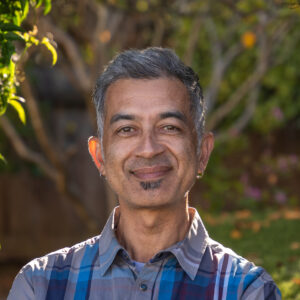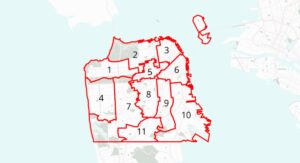Many members of the Lick-Wilmerding High School community, including seniors, are of age to vote, and it is crucial for everyone to be informed and educated of the 15 propositions (props) that will shape the near future of San Francisco. The November 2022 ballot is especially important as voters will have an opportunity to vote on affordable housing productionprocesses, the future of car-free John F. Kennedy Promenade (JFK) , the future of public transportation in the city, commission oversight, funding for public schools, the structure of elections in the city and more. The election will take place on November 8, 2022.
Housing
San Francisco is falling behind in its housing production. Many San Franciscans agree that they need to build more housing and make it more affordable, however the question lies in how. The two most contentious measures on the November 2022 ballot are Prop D and Prop E.
Prop D is authored by Mayor London Breed and streamlines affordable housing, with few required price minimums. Proponents say the measure would accelerate the production of housing, and overall increase housing supply for all income levels. According to the San Francisco Standard, Supervisor Matt Dorsey, is a proponent of Breed’s measure because he believes that the city is failing in its affordable housing production, and the public needs to take whatever steps necessary to produce more housing. Opponents say because of the little minimums, the measure would produce expensive and market-price housing that would make it inaccessible to the working class.
Prop E, authored by Supervisor Connie Chan, adds additional affordable housing requirements and has a stricter development process. Proponents say the measure would do a sufficient job of producing affordable housing and avoid excess market-rate housing. Opponents to the measure say that the added restrictions to the process would make it more difficult to produce a sufficient amount of housing.
Prop M would create a vacancy tax on residential unit homeowners with homes that have been empty for longer than 182 days. There are cases where owners could be exempt from the tax, such as when the owner of a vacant single family home is in permanent care, or when a unit is undergoing repair or construction. Tax revenue is planned to go to the Housing Activation Fund, which works to subsidize rent for seniors and lower-income people. According to the San Francisco Standard, Supervisor Dean Preston is a proponent of the measure because it will incentivize landlords to rent out their vacant units, which would increase the supply of housing in the city. Opponents to the measure say that it violates private property rights and that over time, the ordinance could be expanded without voter approval.
Golden Gate Park
 There are also several measures pertaining to equity and access to Golden Gate Park, a heated topic amongst SanFranciscans this past year. During the pandemic, Breed temporarily closed the JFK in Golden Gate Park to giveSan Franciscans a recreational space safe away from cars.
There are also several measures pertaining to equity and access to Golden Gate Park, a heated topic amongst SanFranciscans this past year. During the pandemic, Breed temporarily closed the JFK in Golden Gate Park to giveSan Franciscans a recreational space safe away from cars.
The San Francisco Municipal Transportation Agency (SFMTA) and the SF Recreation and Parks Department (SFRPD) created the Golden Gate Access & Safety Program, making car-free JFK permanent. However, this November voters will decide whether to keep the promenade car-free through Prop I and Prop J.
Prop I, proposed by San Francisco citizens Howard Chabner and Richard Corriea, would re-authorize cars on JFK and the Great Highway. Prop I would scrap the city’s Ocean Beach Climate Adaptation Plan which is currently working to turn the Great Highway into a park with a trail. Proponents of Prop I state that reauthorizing cars on JFK and the Great Highway would allow seniors, disabled people and those who live further away greater access to the park. Opponents say that it would take away the recreationality of the parks, while also costing the City $80 million in infrastructure pricing.
Prop J, sponsored by Supervisors Rafael Mandelman, Myrna Melgar, Dorsey and Hillary Ronen was authored as a response to Prop I. Prop J would keep JFK car-free, and would also move forward with the public process to determine future uses of the Great Highway. It would also allow the City to move forward with its Ocean Beach Climate Adaptation Plan. Proponents of Prop J state that keeping JFK car-free and the Great Highway car-free on the weekends would make the parks safer and more recreational. Proponents also say that Prop J would allow the city to tackle various climate change issues. Opponents of Prop J say that making JFK car-free makes the parks inequitable and inaccessible to seniors, disabled people and those who live further away. The prop that gets more votes will overrule the other.
Additionally, Breed has proposed Prop N, which would give SFRPD ownership of the Music Concourse garage in Golden Gate Park to turn into public parking. This would turn the privately owned and funded garage to a publicly accessible garage, giving opportunity to those who live further away to access the park by car. Proponents of Prop N agree that Prop N should pass with Prop J to keep the parks safe and recreational, while also ensuring all communities have access to the park. There is currently no organized opposition to this measure.
Transportation
There are many initiatives for equitable and efficient public transportation in San Francisco. There will be a measure to sustain the City’s existing half-cent transportation sales tax which was first passed as Prop B by voters in 1989. It was reauthorized as Prop K in 2003, and is now Prop L on the November 2022 ballot. Prop L was introduced by Mandelman who is Chair of the San Francisco County Transportation Authority (SFCTA). The prop was sponsored by all Supervisors with the exception of Chan. It would extend the current transportation tax from 2033 to 2053 and would also approve and codify a new transportation spending plan from the tax’s revenue. Proponents of the tax highlight that the transportation sales tax revenue is the most significant source of funding for the city’s transportation system. According to San Francisco Bay Area Urban Planning and Research Association (SPUR), proponents of Prop L said that “without the projects funded by Prop K, Muni service will deteriorate, ridership will decline, and automobile use and congestion will increase.” Alexander Hirji is member of the SFCTA Expenditure Plan Advisory Committee (EPAC) which works to finalize the expenditure plan from revenue gained from the tax. Hirji said that Prop L is “extremely important because it will help build the city of the future.” According to the SPUR, opponents to Prop L believe that a half-cent tax is not enough for sustainable and significant change and are also skeptical of Prop L because the promises of 1989 Prop B, an exact replica of this year’s Prop L, were never thoroughly carried out. Opponents also say that the measure would add to the City’s $3 million debt.
Bureaucracy and Commission Oversight
Scandals in City Hall bureaucracy have raised concerns about the City’s commissions. Prop B and Prop C would refine some of the city’s most contentious commissions. In 2020, Prop B amended the city charter and split the Department of Sanitation and Streets into two separate departments. The 2020 Prop B created two oversight bodies for each department. Supervisor Aaron Peskin authored Prop B for the November 2022 ballot to put the Department of Sanitation and Streets under the Department of Public Works (DPW), consolidating it into one department. DPW would dedicate maximum time and resources to clean the streets and reform for change, minimizing the bureaucracy in the process that existed with having two separate departments. This proposition was sponsored by Chan and Mandelman. Opponents to the measure say that the measure is contradictory to the previous Prop B and goes against the will of voters. Opponents also say that DPW needs more time to begin its operations.
Prop C, authored by Supervisor Ahsha Safai and unanimously sponsored among the Supervisors, would create the Homelessness Oversight Commission. The commission would oversee the Department of Homelessness and Supportive Housing (HSH). It would also create a mandatory audit program under the Controller’s Office to audit the HSH to create greater transparency. Prop C would give the commission its own independent ability to work with the Controller’s office, which most other commissions aren’t legislated to do. Jack Gallagher, campaign manager for Prop C, said that Prop C would generally “create avenues for public insight” and give HSH more perspective and direction. Opponents to the proposition say that creating another commission would create even more bureaucracy, instead of creating the oversight that it needs.
Education
There are also propositions that work to provide and enhance educational opportunities for San Francisco students, such as Prop G and Prop F. The Student Success Fund, or Prop G, authored by Ronen, will divert millions of the city’s property taxes towards San Francisco public schools. The proposition was sponsored by Supervisors Myrna Melgar, Shamman Walton, Safai, Gordon Mar, Dean Preston, Rafael Mandelman, Matt Dorsey and Catherine Stefani — a majority of the board. According to the SF Chronicle, San Francisco is a county that collects more property tax revenue needed to meet state funding requirements. If the ballot measure passes, each school would receive up to $1 million in grants from the Educational Revenue Augmentation Fund (ERAF). With the excess property tax revenue, schools would be able to create programs to support students academically and socially to bridge educational inequities. The Department of Children, Youth, and Families would work with the San Francisco Unified School District (SFUSD) to administer this grant process. Opponents say that the proposition has a too vague a mandate for its funding distribution process which would create greater bureaucracy, and it would take away funds from other necessary city measures.
The Library Preservation Fund, or Prop F, was authored by Mayor Breed and unanimously sponsored by the Supervisors. Prop F would renew a fund that has supported the city’s libraries for 25 years. According to the SF Standard, the money behind the fund comes from an annual property tax set-aside of 2.5 cents for every $200. There is currently no organized opposition to this measure.
Civic Engagement
Prop H, authored by Preston and sponsored by Peskin, works to boost voter turnout by moving the Mayor, District Attorney, City Attorney, Sheriff and Treasurer elections to even-numbered years — the years in which presidential elections occur. This prop would restructure how elections are run in the city. “San Francisco is known to be a progressive, trend-setting city and [Prop H] is our chance to meet those progressive ideals and have a stronger voice in our local government,” said Prop H campaign manager Shae Watson. Opponents of Prop H say that the measure would make the ballots too long, which would decrease how thoughtful and intentional people are with their votes. Opponents also highlight that the measure would also add an extra year to Mayor London Breed’s term which voters did not vote on or agree to in 2018.
Money and Taxes
Prop A would support 4,500 retired workers to keep up with rising inflation prices by correcting an error which blocked retirement fund ajustements. Lowest-income retirees will benefit the most from this prop. There is currently no organized opposition to this measure.
Prop O would create a brand new parcel tax that would start in 2023. The measure would increase taxes on residential and commercial properties to raise money for student services, immigrant job development programs and equity initiatives for the City College of San Francisco (CCSF). If passed, Prop O would bring in over $43 million for CCSF. Proponents of the proposition say that the measure would temporarily target valuable properties in order to bring back CCSF services. Opponents to the measure say that CCSF needs more accountability and governance, especially if they were to receive a large amount of funding from the tax.






